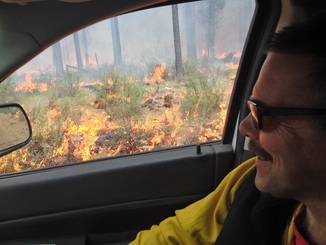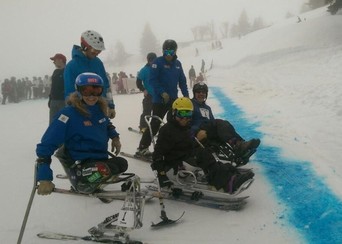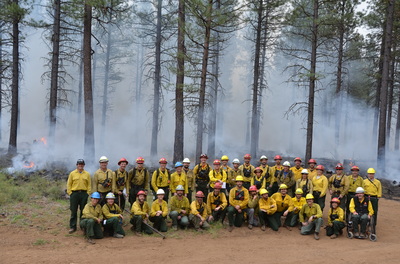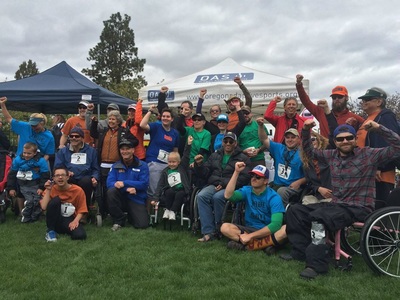By Geoff Babb
It’s the Friday before Memorial Day and I’m taking an extra day off. I’m beat but feeling good. Yesterday was the culmination of a busy week that included the first Central Oregon Prescribed Fire Training Exchange (TREX), and Pole Pedal Paddle (PPP). I’ve been working with several people with the Forest Service (Trevor Miller and Gabriel Cortez) and The Nature Conservancy (Pete Caligiuri and Jeremy Bailey) for over two years to organize TREX. About 35 people from all parts of Oregon, representing The Nature Conservancy, Forest Service, BLM, and private contractors, came to Central Oregon to learn about fire ecology and public perceptions of prescribed fire and its associated smoke, and how to craft messages to communicate with the media and public about how fire is an important part of healthy ecosystems. Most of our days were spent in the field, with four of them conducting prescribed burns. A highlight of the week was old friend and mentor Penny Morgan coming over from Idaho to help out. Dirty, smiling faces (and good feedback, of course!) told us that we were successful.
In the middle of the 8th day TREX was PPP. For the past 5 years I’ve worked with Oregon Adaptive Sports (OAS) to organize teams to race in the disabled division and this year we fielded three teams – True Grit, Onward!, and No Boundaries. The race consists of 6 legs and stretches from Mt. Bachelor to Bend.
It was snowing lightly when double leg amputee Ravi Drugan, Gabriel Rousseau (Muscular Dystrophy), and I (a stroke survivor) with a bucket assist from Dave Weil, led off the race with the alpine ski leg. X-Games bronze medalist Ravi led us through a rolling start that had us laughing for most of the three and a half minutes it took to get down the hill.
Because of a lack of snow, a 2.5 mile trail running leg had to be substituted for the traditional Nordic ski leg, but it didn’t deter visually impaired Nancy Stevens and her guide Renae Gibbons as they bounded down muddy 45 degree slopes over and around rocks and logs.
After returning to the West Village parking lot, cyclists Steve Burns (multiple broken bones and lost vision in one eye from a firefighting accident), Dave O’Connor (also with multiple broken bones and a traumatic brain injury from a head-on crash), and Scott Taylor (spinal cord injury) took over. Dave exemplified his own grit by overcoming a derailleur malfunction that forced him to use one gear – the hardest one – the entire race. His spirits were still high at the finish, despite being physically spent.
Twenty-two miles later was the running leg on the Deschutes River Trail. Susan Zimmerman, just three and a half weeks after reconstructive surgery following breast cancer, ran the 5 miles “with a big smile” while Amy Neff pushed her 9 year-old son Jack in a stroller. Jack’s cerebral palsy couldn’t stop him from using his walker to take him to the transition with the paddlers. (Read more about Susan's inspiring journey here)
Waiting at the beach of the Deschutes River in Riverbend Park were kayakers Myles Bagley and James Fredericks, both with spinal cord injuries, and visually impaired Darwin Simtustus and his partner Jonathan Rall for the 1.5 mile leg on the river, which involves paddling upstream against a sometimes challenging current with crowds cheering from the Old Mill footbridge and banks.
Finally, the “sprinters”, stroke survivor Sharon Van Meter, 12 year-old Ben Finestone with Down’s syndrome, and 9 year-old Emmy Pfankuch with Spina Bifuda, covered the final half mile into the Les Schwab Amphitheater. Emmy had her trade-mark smile as she navigated the last uphill stretch of grass to push her wheelchair across the finish line.
As with TREX, I measured success by the smiles and laughter at the post race celebration. These smiles mean more to me though, because, as opposed to the smiles of firefighters who must be in peak physical shape to pass their annual fitness tests, these smiles are from those of us who I sometimes call “the Island of Broken Toys.” Whether born with it, or acquired through accident, disease, or some sort of medical condition, we all have our own challenges and PPP allows us to laugh and triumph over them. Regardless of the race number or shirt color, we were all winners that day.
I call PPP my most inspiring day of the year and May 16 was certainly no different. Thank you to all the OAS staff and volunteers, and the sponsors that made it possible. We all really appreciate it!
-> Read more at http://cascadebusnews.com/oregon-adaptive-sports-ppp-team-the-only-true-disability-is-a-closed-mind/ (with pictures from 2014) and http://www.bendbulletin.com/sports/3165654-151/big-day-for-adaptive-athletes.
-> See more pictures at https://www.facebook.com/media/set/?set=a.10155571599520153.1073741853.320959455152&
It’s the Friday before Memorial Day and I’m taking an extra day off. I’m beat but feeling good. Yesterday was the culmination of a busy week that included the first Central Oregon Prescribed Fire Training Exchange (TREX), and Pole Pedal Paddle (PPP). I’ve been working with several people with the Forest Service (Trevor Miller and Gabriel Cortez) and The Nature Conservancy (Pete Caligiuri and Jeremy Bailey) for over two years to organize TREX. About 35 people from all parts of Oregon, representing The Nature Conservancy, Forest Service, BLM, and private contractors, came to Central Oregon to learn about fire ecology and public perceptions of prescribed fire and its associated smoke, and how to craft messages to communicate with the media and public about how fire is an important part of healthy ecosystems. Most of our days were spent in the field, with four of them conducting prescribed burns. A highlight of the week was old friend and mentor Penny Morgan coming over from Idaho to help out. Dirty, smiling faces (and good feedback, of course!) told us that we were successful.
In the middle of the 8th day TREX was PPP. For the past 5 years I’ve worked with Oregon Adaptive Sports (OAS) to organize teams to race in the disabled division and this year we fielded three teams – True Grit, Onward!, and No Boundaries. The race consists of 6 legs and stretches from Mt. Bachelor to Bend.
It was snowing lightly when double leg amputee Ravi Drugan, Gabriel Rousseau (Muscular Dystrophy), and I (a stroke survivor) with a bucket assist from Dave Weil, led off the race with the alpine ski leg. X-Games bronze medalist Ravi led us through a rolling start that had us laughing for most of the three and a half minutes it took to get down the hill.
Because of a lack of snow, a 2.5 mile trail running leg had to be substituted for the traditional Nordic ski leg, but it didn’t deter visually impaired Nancy Stevens and her guide Renae Gibbons as they bounded down muddy 45 degree slopes over and around rocks and logs.
After returning to the West Village parking lot, cyclists Steve Burns (multiple broken bones and lost vision in one eye from a firefighting accident), Dave O’Connor (also with multiple broken bones and a traumatic brain injury from a head-on crash), and Scott Taylor (spinal cord injury) took over. Dave exemplified his own grit by overcoming a derailleur malfunction that forced him to use one gear – the hardest one – the entire race. His spirits were still high at the finish, despite being physically spent.
Twenty-two miles later was the running leg on the Deschutes River Trail. Susan Zimmerman, just three and a half weeks after reconstructive surgery following breast cancer, ran the 5 miles “with a big smile” while Amy Neff pushed her 9 year-old son Jack in a stroller. Jack’s cerebral palsy couldn’t stop him from using his walker to take him to the transition with the paddlers. (Read more about Susan's inspiring journey here)
Waiting at the beach of the Deschutes River in Riverbend Park were kayakers Myles Bagley and James Fredericks, both with spinal cord injuries, and visually impaired Darwin Simtustus and his partner Jonathan Rall for the 1.5 mile leg on the river, which involves paddling upstream against a sometimes challenging current with crowds cheering from the Old Mill footbridge and banks.
Finally, the “sprinters”, stroke survivor Sharon Van Meter, 12 year-old Ben Finestone with Down’s syndrome, and 9 year-old Emmy Pfankuch with Spina Bifuda, covered the final half mile into the Les Schwab Amphitheater. Emmy had her trade-mark smile as she navigated the last uphill stretch of grass to push her wheelchair across the finish line.
As with TREX, I measured success by the smiles and laughter at the post race celebration. These smiles mean more to me though, because, as opposed to the smiles of firefighters who must be in peak physical shape to pass their annual fitness tests, these smiles are from those of us who I sometimes call “the Island of Broken Toys.” Whether born with it, or acquired through accident, disease, or some sort of medical condition, we all have our own challenges and PPP allows us to laugh and triumph over them. Regardless of the race number or shirt color, we were all winners that day.
I call PPP my most inspiring day of the year and May 16 was certainly no different. Thank you to all the OAS staff and volunteers, and the sponsors that made it possible. We all really appreciate it!
-> Read more at http://cascadebusnews.com/oregon-adaptive-sports-ppp-team-the-only-true-disability-is-a-closed-mind/ (with pictures from 2014) and http://www.bendbulletin.com/sports/3165654-151/big-day-for-adaptive-athletes.
-> See more pictures at https://www.facebook.com/media/set/?set=a.10155571599520153.1073741853.320959455152&



